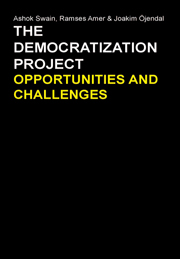Book contents
- Frontmatter
- Contents
- List of Tables
- List of Figures
- Acknowledgements
- Contributors
- The Democratization Project: Opportunities and Challenges
- 1 The Democratization Project: Peace, Conflict and Development
- 2 Non-Authorized Military Interventions and Legitimization by the United Nations
- 3 From Condemnation to Legitimization of Outcome: The United Nations and the Use of Force in Inter-State Relations
- 4 Demos or Deus: Patterns of Religious Dimensions in Asian Armed Conflicts, 1945–2005
- 5 The Left and Democratic Consolidation – Deepening Democracy in Latin America?
- 6 Democracy without People? – The Risk of Monopolizing the Democratization Project
- 7 The Role of Hamas in Building Palestinian Democracy in the Midst of Violence
- 8 Elections and Violence in Sri Lanka: Understanding Variation Across Three Parliamentary Elections
- 9 Post-Accord Elections and Armed Conflict
- 10 Peace Through Democracy? The Challenges of Postwar Democratization in Weak and War-Torn States
7 - The Role of Hamas in Building Palestinian Democracy in the Midst of Violence
Published online by Cambridge University Press: 05 March 2012
- Frontmatter
- Contents
- List of Tables
- List of Figures
- Acknowledgements
- Contributors
- The Democratization Project: Opportunities and Challenges
- 1 The Democratization Project: Peace, Conflict and Development
- 2 Non-Authorized Military Interventions and Legitimization by the United Nations
- 3 From Condemnation to Legitimization of Outcome: The United Nations and the Use of Force in Inter-State Relations
- 4 Demos or Deus: Patterns of Religious Dimensions in Asian Armed Conflicts, 1945–2005
- 5 The Left and Democratic Consolidation – Deepening Democracy in Latin America?
- 6 Democracy without People? – The Risk of Monopolizing the Democratization Project
- 7 The Role of Hamas in Building Palestinian Democracy in the Midst of Violence
- 8 Elections and Violence in Sri Lanka: Understanding Variation Across Three Parliamentary Elections
- 9 Post-Accord Elections and Armed Conflict
- 10 Peace Through Democracy? The Challenges of Postwar Democratization in Weak and War-Torn States
Summary
This chapter deals with Palestinian efforts towards democratization, with a special focus on one of the dominant actors: the Islamic Resistance Movement, Harakat al-Muqawamah al-Islamiyya (Hamas). Palestinian society in the West Bank and the Gaza Strip is in the midst of a state- and nationbuilding process, in conflict with Israel, and is also engaged in a difficult nonlinear democratization process. However, since the elections, and despite attempts to maintain the short-lived coalition government, competition between Hamas and Fateh has erupted into violence, propelling Palestinian society to the brink of open internal war. The election victory of Hamas in January 2006 could be seen as a first step away from the one-party rule of the Palestinian Authority that, until 2006, was dominated by Fateh.
This chapter is not concerned with the question of ‘how a democracy, assumed to be already in existence, can best preserve or enhance its health and stability’– it is clear that authoritarian structures are in existence in the Palestinian politicalelite structure. The chapter looks to identify factors that can either promote or inhibit Palestinian democratization. It does not necessarily imply a deterministic process in which democracy will follow. Rather, democratization is an open palette, in which research is needed to identify the democratic frontiers in societies that are experimenting with, or searching for ways to follow, democratic principles. The concept of democratic frontiers relates to societal spheres, with structures, institutions and agencies that have a strong democratic culture, and whose centre may disperse into other parts of (authoritarian) society.
- Type
- Chapter
- Information
- The Democratization ProjectOpportunities and Challenges, pp. 113 - 134Publisher: Anthem PressPrint publication year: 2009

